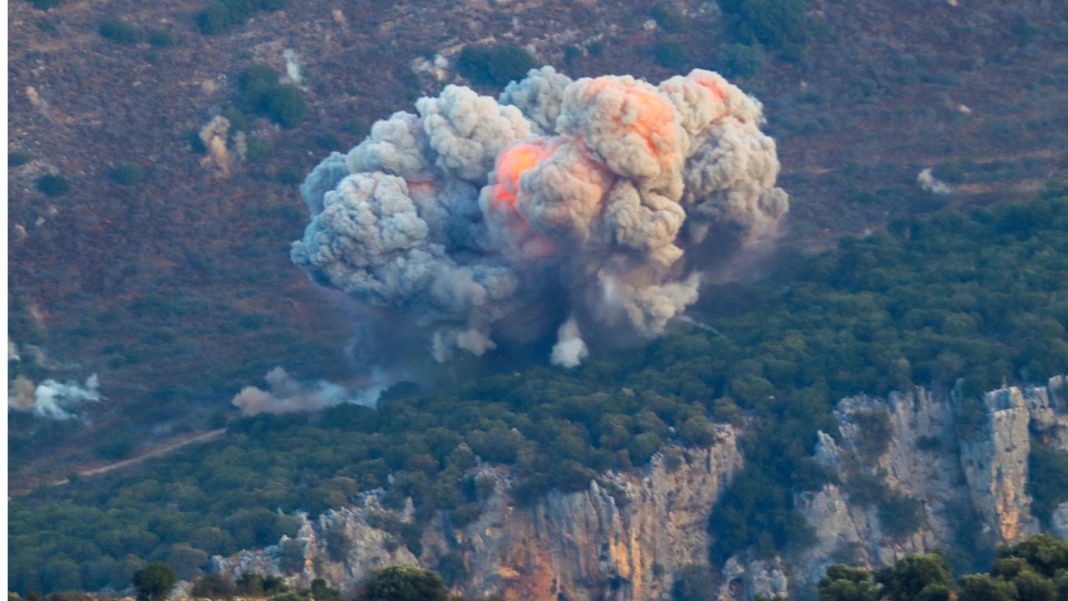Israel submitted an “extensive” three-page request last week for additional munitions and armaments to the Biden administration, a senior US official and former US official told MEE.
Israel did not request new types of weapons but is looking to replenish stockpiles from its US ally which have been depleted, as fighting with Hezbollah escalates, the current and former US officials said.
One weapons system that Israel is asking the US to refill are interceptors for the Arrow missile defense system, the current and former US officials told MEE.
Analysts and former US officials say it would be used if Israel came under attack from long-range missiles fired by Iran, Hezbollah or the Houthis in Yemen.
Last week’s request includes more US military aid and foreign military sales, the latter of which Israel buys with its sovereign funds.
Behnam Ben Taleblu, a senior fellow at the Foundation for Defence of Democracies, told MEE it is not surprising the Biden administration would seek to put new roadblocks on weapons transfers, which is “consistent with other signs from the Biden administration that it is prioritising de-escalation over deterrence”.
US officials are concerned that Israel’s intense bombing campaign inside Lebanon could escalate into a full-blown regional war, and there are signs that the Biden administration is frustrated with Israel.
Unlike during previous rounds of tension, Biden has not spoken on the phone with Prime Minister Benjamin Netanyahu since Israel detonated thousands of explosive pagers and walkie-talkies in Lebanon last week.
Biden is also not scheduled to meet Netanyahu when he is in the US for the United Nations General Assembly.
“My team has been in constant contact with their counterparts, and we’re working to de-escalate in a way that allows people to return to their home safely,” Biden said on Monday, as he hosted UAE President Mohamed bin Zayed al-Nahyan at the White House.
Over the weekend, John Kirby, the US National Security Council spokesperson, told ABC News the US is warning Israel against launching a full-scale war on Hezbollah.
“We don’t believe that a military conflict, and we’re saying this directly to our Israeli counterparts . . . we don’t believe that escalating this military conflict is in their best interest,” Kirby added.
In May, the US announced it was leveraging arms transfers to head off an Israeli invasion of the southern Gaza city of Rafah, with the White House saying it delayed two shipments of 500-pound bombs and 2,000-pound bombs. Israel invaded Rafah and in July the US resumed shipments of 500-pound bombs to Israel.
In August, the US approved a $20bn weapons sale to Israel.
If a full-blown regional war erupts, Israel will need the Arrow system, which is one part of its layered air defence systems.
The Arrow system uses interceptors to shoot down ballistic missiles flying at high altitudes. Israel uses the Iron Dome to intercept short-range projectiles, and David’s Sling to intercept medium-range projectiles.
The Arrow 2 is used to intercept long-range atmospheric missiles that are likely to be fired by Iran and Hezbollah. Arrow 3 is used to intercept high-altitude missiles outside the atmosphere, that analysts say the Houthis and Iran are capable of firing.
The Arrow system intercepted most of the ballistic missiles fired by Iran at Israel in April when the Islamic Republic retaliated for an Israeli strike on its consulate in Damascus, Syria, analysts say.
Israel is also running through offensive munitions at a fast pace, US officials tell MEE, and at least some of the missiles and bombs need to be refilled.
Footdragging on the Israeli request is coming from some quarters of the State Department and the White House, the current and former officials say.
On Monday, Israel launched hundreds of strikes across Lebanon, in what was the deadliest day of fighting between Israel and Hezbollah since the 2006 Lebanon war. The air raids continued on Tuesday, leaving at least 569 people, including women and children, killed and hundreds injured, according to Lebanon’s health ministry.
Israel’s ability to target senior Hezbollah commanders and missile sites depends on its fighter jets having a steady stream of munitions from the US.
Joint Direct Attack Munitions – kits that provide GPS navigation to unguided bombs – allow Israel to strike targets based on its intelligence.
Fabian Hinz, a research fellow at the International Institute for Strategic Studies, said footage of Israel’s strikes on Monday also suggests they are using “electro-optical imaging infrared seekers” to guide warheads.
“In Israeli imagery of strikes on cruise missiles inside houses, you can basically see a video feed being relayed to the operator until the last minute,” Hinz added, which is an indication of infrared seekers being used.
Hezbollah boasts around 150,000 missiles and rockets. It began retaliating against Israel on 8 October in solidarity with besieged Palestinians in the Gaza Strip.
Until now, Hezbollah has concentrated its fire on northern Israel, displacing around 60,000 Israeli civilians. On Monday it began widening its attacks to the suburbs of Haifa.
The US has provided almost unconditional military support to Israel since the Hamas-led attacks on 7 October on southern Israel, and Tel Aviv’s subsequent invasion of Gaza.
A new investigation by ProPublica revealed on Tuesday that US officials have maintained a steady supply of arms to Israel despite USAID and the head of the State Department’s Bureau of Population, Refugees and Migration concluding that Israel was blocking aid into Gaza. The State Department’s bureau went so far as to say that the Foreign Assistance Act should be triggered to freeze $830m in weapons sales to Israel.
